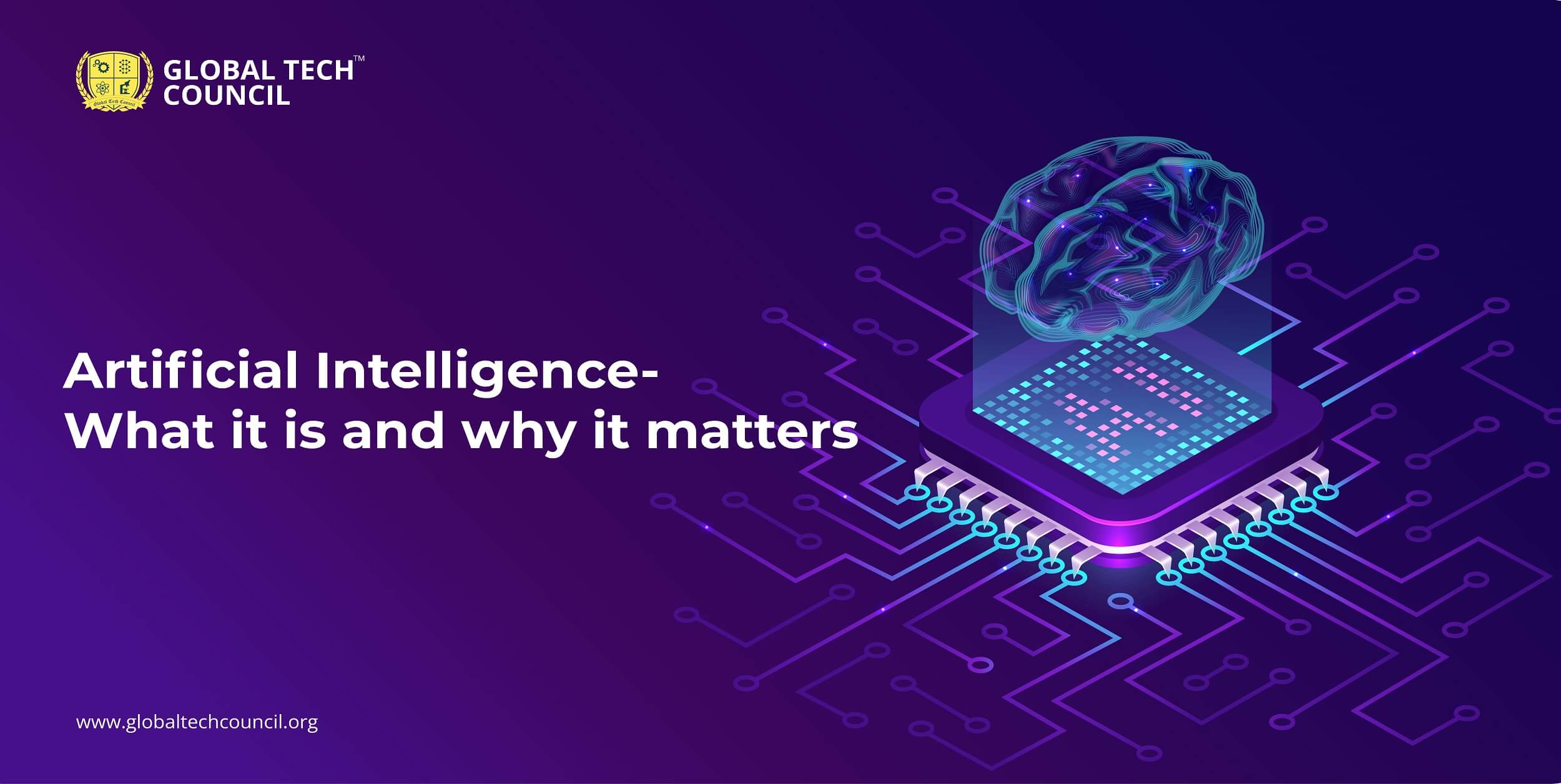
Artificial intelligence is bringing such innovations into the tech world that nobody thought of decades ago. Today we have machines that can process work and understand tasks like the human brain does. In fact, AI has been driving chess-playing computers to automatic cars today. Moreover, with the help of subdomains of artificial intelligence such as deep learning, machine learning, NLP, computers and machines are gaining expertise in performing specific as well as a broad range of tasks.
Due to its increasing applications currently, we can easily find artificial intelligence certification programs accessible globally. So if you also want to become an AI developer, then ensure choosing the right AI certification from a reputed resource.
So let us understand what artificial intelligence is and why it is so important.
What is Artificial Intelligence?
The artificial intelligence space refers to the development of computer frameworks that utilize massive data sets to carry out intelligent tasks, such as comprehending natural language, thinking visual perception, using reasoning to make decisions, etc.
Here machine learning, a subdomain of artificial intelligence, plays a key role in providing experiences and examples to the machine or computer to help it learn how it should function. However, if you want to become an expert AI developer or artificial intelligence expert of some shot, then taking up AI certification is the best option.
Understanding the working mechanism of Artificial Intelligence
Artificial intelligence works by utilizing the enormous data available with quicker, intelligent algorithms and iterative processing. Further, it allows the software to understand the features and patterns of the data automatically. Moreover, artificial intelligence is an extensive field of study that comprises numerous theories, technologies and methods.
Here are some important domains of artificial intelligence:
Machine learning
It enables automated analytical model creation. For this, it utilizes techniques from operations research and physics, neural networks, statistics to discover and extract meaningful insights from the data available. Further, the best part is, it does not require explicit programming to learn where to look for meaningful information and what should be the suitable conclusion.
Neural network
One of the forms of machine learning, neural networks, comprises neurons that are interconnected units. Further, it processes data by relaying data among every unit and acknowledging external units. Here the proceedings need numerous passes at the data to discover connections and extract valuable information from undefined data. An AI certification will let you learn more about this subdomain.
Deep learning
It uses massive neural networks that contain multiple processing unit layers. Further, it takes advantage of updated computing power and enhancement in training techniques to understand complicated patterns within the massive data. Some of the usual applications of deep learning involve speech and image recognition.
Computer vision
Deep learning and pattern recognition are the main drivers of computer vision, helping it understand the objects in a video or image. Furthermore, machine learning has the power to understand and analyze pictures. Additionally, it captures timely videos and images as well as interprets its environment.
Natural language processing (NLP)
An Artificial intelligence expert needs to have an understanding of natural language processing in the AI space. Basically, it is the computer’s capability to comprehend and create humanized language involving speech. Furthermore, advanced NLP allows users to interact with machines using normal human language.
What is the importance of artificial intelligence?
Here are a few factors that make artificial intelligence important:
- Businesses can automate repetitive business-related tasks, including data discovery and learning, with the help of artificial intelligence. Moreover, it has the capability to perform high volume programmed processing consistently.
- Artificial intelligence is improving the capabilities of existing products by making them intelligent, for example, Siri. Further, it will enable a successful blend of conversational platforms, automation, smart machines and bots with enormous data sets to enhance the functionality of many existing technologies. Moreover, it can drive useful upgrades in the workplace and home systems, including smart cams and security intelligence.
- When you take the course to become an artificial intelligence expert, you will discover that this technology adapts high-performing ability through progressive learning algorithms. Hence such learning algorithms allow artificial intelligence to program itself to perform the desired tasks.
- The neural networks allow the AI developer teams to create robust detection frameworks by using five different hidden layers. However, you will need normal data to train such frameworks.
- Artificial intelligence has the potential to achieve incredible accuracy. For example, when you use a virtual assistant like Google or Alexa, the data they provide tends to get more precise the more you interact with them.
- Implementing AI in businesses helps them to achieve a competitive edge. It implies that you will always be ahead of your rivals by having the most valuable data in the industry. Take up the best AI certification accessible to you to learn business applications of AI in today’s world.
Conclusion
No matter which tech space you are going to work with, artificial intelligence is going to be instrumental in your workspace. Due to its capability to process enormous data sets at a faster rate, companies will be able to discover relevant answers much quicker. Furthermore, it allows us to scale up our computing power which is more quick and accurate than human brainpower. Give a visit to the GLOBAL TECH COUNCIL if you want to learn more about the technical field and its robust advancements.